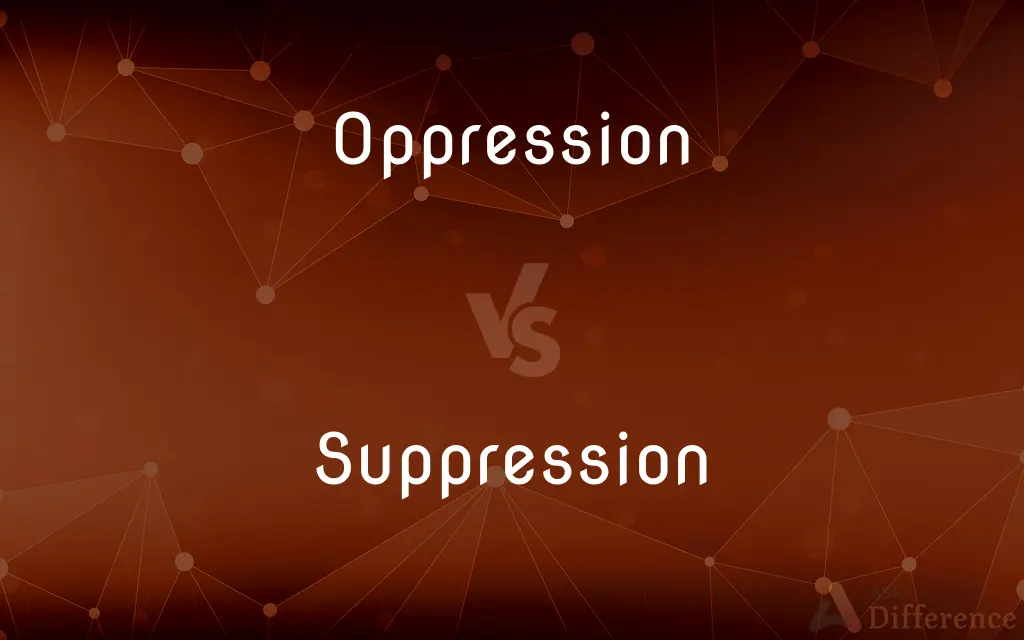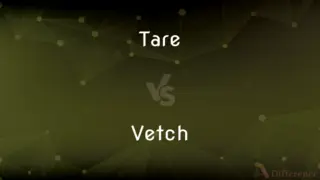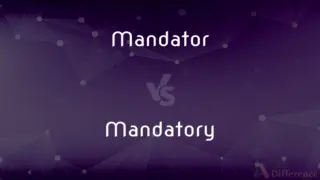Oppression vs. Suppression — What's the Difference?
Edited by Tayyaba Rehman — By Fiza Rafique — Updated on September 25, 2023
"Oppression" refers to prolonged cruel or unjust treatment, often by a governing power. "Suppression" means intentionally preventing or restraining an activity or expression. Both denote control, but their contexts and implications vary.

Difference Between Oppression and Suppression
Table of Contents
ADVERTISEMENT
Key Differences
"Oppression" denotes a system or act of prolonged cruelty, unfairness, or injustice. It often implies a misuse of power or authority. Societies that have marginalized groups facing discrimination and inequity are frequently described as experiencing oppression. Conversely, "Suppression" pertains to the act of preventing or stopping something, often by force. This can be seen in contexts like suppressing a rebellion or suppressing emotions.
When we discuss "Oppression," we touch upon the weight of continuous subjugation, where individuals or groups are kept down by unjust means. This can be because of their race, gender, religion, or other defining aspects. "Suppression," on the other hand, captures the act of intentionally putting an end to or limiting a particular action, thought, or feeling. For instance, a regime might suppress information or news deemed unfavorable.
The term "Oppression" can signify both physical and psychological burdens. Individuals under oppressive regimes may live in fear, face discrimination, and struggle for basic rights. When one examines "Suppression," it can also encompass both physical acts (like suppressing a protest) and mental actions (such as suppressing a memory). The commonality lies in the act of control or limitation.
Conclusively, while both "Oppression" and "Suppression" revolve around control and constraint, their applications diverge. "Oppression" emphasizes sustained unjust treatment and dominance, typically by a ruling power. In contrast, "Suppression" underscores the deliberate act of preventing or hindering, often in a more immediate or specific context.
Comparison Chart
Meaning
Prolonged unjust or cruel treatment
Intentional prevention or restraint
ADVERTISEMENT
Context
Often societal or systemic
Can be individual or collective
Duration
Implies a prolonged or enduring nature
Can be temporary or long-term
Typical Usage
Discrimination, societal injustice
Restraining emotions, preventing information flow
Agency
Often by those in power
Can be by an individual or an entity
Compare with Definitions
Oppression
A system in which people are prevented from having opportunities and freedom.
The nation fought against years of oppression to attain democracy.
Suppression
Intentionally not allowing something to continue or develop.
The suppression of new technologies by monopolistic companies can hinder progress.
Oppression
A feeling of being weighed down, mentally or physically.
The oppression of his guilt was overwhelming.
Suppression
Preventing something from being seen or expressed.
The suppression of free speech is a violation of human rights.
Oppression
The act of subjugating by cruelty, force, or unjust use of authority.
The oppression of minority groups remains a global concern.
Suppression
The act of stopping or restraining by force.
The government's suppression of the protests drew international criticism.
Oppression
Severe physical or mental pressure or distress.
The oppression of the hot, humid weather was inescapable.
Suppression
The act of keeping emotions or thoughts from being expressed.
His suppression of grief at the funeral was evident to his friends.
Oppression
Oppression is malicious or unjust treatment or exercise of power, often under the guise of governmental authority or cultural opprobrium. Oppression may be overt or covert, depending on how it is practiced.
Suppression
Stopping or reducing the activity of a bodily organ or secretion.
The medicine results in the suppression of the immune response.
Oppression
The action of oppressing; arbitrary and cruel exercise of power
A system of oppression.
Suppression
The action of suppressing something such as an activity or publication
The heavy-handed suppression of political dissent
Oppression
The state of being oppressed
Caught in the oppression of poverty.
Suppression
The act of suppressing.
Oppression
A feeling of being weighed down in mind or body
"Every time I entered my house, an oppression settled on me so heavy that I had to stand for minutes at a time in the doorway, gathering what strength I could find" (Erin McGraw). "One has ... to come under the shadow of war to feel fully its oppression" (J.R.R. Tolkien).
Suppression
The state of being suppressed.
Oppression
The exercise of authority or power in a burdensome, cruel, or unjust manner.
Suppression
(Psychiatry) Conscious exclusion of unacceptable desires, thoughts, or memories from the mind.
Oppression
The act of oppressing, or the state of being oppressed.
Extreme freedom is followed by extreme oppression, said Plato.
Suppression
(Botany) The failure of an organ or part to develop.
Oppression
A feeling of being oppressed.
Our oppression was lifted by the reappearance of the sun.
Suppression
(Genetics) The inhibition of gene expression.
Oppression
The act of oppressing, or state of being oppressed.
Suppression
The act or instance of suppressing.
Oppression
That which oppresses; a hardship or injustice; cruelty; severity; tyranny.
Suppression
The state of being suppressed.
Oppression
A sense of heaviness or obstruction in the body or mind; depression; dullness; lassitude; as, an oppression of spirits; an oppression of the lungs.
There gentle SleepFirst found me, and with soft oppression seizedMy drowsed sense.
Suppression
(psychology) A process in which a person consciously excludes anxiety-producing thoughts, feelings, or memories.
Oppression
Ravishment; rape.
Suppression
(military) The entirety of acts aimed at stopping or preventing the enemy to execute such unwanted activities like firing, regrouping, observation or others.
Oppression
The act of subjugating by cruelty;
The tyrant's oppression of the people
Suppression
(of an eye) A subconscious adaptation by a person's brain to eliminate the symptoms of disorders of binocular vision such as strabismus, convergence insufficiency and aniseikonia.
Oppression
The state of being kept down by unjust use of force or authority:
After years of oppression they finally revolted
Suppression
The act of suppressing, or the state of being suppressed; repression; as, the suppression of a riot, insurrection, or tumult; the suppression of truth, of reports, of evidence, and the like.
Oppression
A feeling of being oppressed
Suppression
Complete stoppage of a natural secretion or excretion; as, suppression of urine; - used in contradiction to retention, which signifies that the secretion or excretion is retained without expulsion.
Oppression
Unjust or cruel exercise of power.
The dictatorship's oppression led to mass protests.
Suppression
Omission; as, the suppression of a word.
Suppression
(botany) the failure to develop of some part or organ of a plant
Suppression
The act of withholding or withdrawing some book or writing from publication or circulation;
A suppression of the newspaper
Suppression
Forceful prevention; putting down by power or authority;
The suppression of heresy
The quelling of the rebellion
The stifling of all dissent
Suppression
(psychology) the conscious exclusion of unacceptable thoughts or desires
Common Curiosities
Is "Suppression" always by force?
No, suppression can be through force, laws, or even psychological means.
Which term relates more to societal structures?
"Oppression" more commonly refers to societal or systemic injustices.
Is "Oppression" always visible?
No, oppression can manifest in subtle, systemic ways not always immediately visible.
Can "Oppression" be unintentional?
"Oppression" typically implies a deliberate act or system, though the oppressors might not always recognize it as unjust.
Do both "Oppression" and "Suppression" indicate negative actions?
Generally, yes. Both terms usually have negative connotations related to control or restraint.
Does "Suppression" always have a political context?
No, "Suppression" can be personal, emotional, or medical, among other contexts.
Can a person feel both oppressed and suppressed?
Yes, one can feel oppressed by societal structures and suppress personal emotions or thoughts simultaneously.
Can you suppress your own emotions?
Yes, individuals often suppress their own emotions for various reasons.
Can societies unknowingly perpetrate oppression?
Yes, systemic oppression can be ingrained and not immediately recognized by all.
Can suppression lead to oppression?
Yes, consistently suppressing certain groups or information can lead to a system of oppression.
Is suppressing information always negative?
Not always. Suppressing sensitive information can sometimes protect individuals or groups.
Is it possible for one to oppress oneself?
While one can suppress personal feelings or thoughts, self-oppression would be an internalized reflection of external pressures.
Is "Oppression" only by those in power?
Typically, oppression involves a misuse of power or authority, so it's often by those in dominant positions.
Can "Suppression" be for one's benefit?
Potentially, like suppressing a harmful habit. However, it often has negative connotations.
Are the two terms interchangeable?
No. While related in theme, "Oppression" and "Suppression" have distinct meanings and applications.
Share Your Discovery

Previous Comparison
Tare vs. Vetch
Next Comparison
Mandator vs. MandatoryAuthor Spotlight
Written by
Fiza RafiqueFiza Rafique is a skilled content writer at AskDifference.com, where she meticulously refines and enhances written pieces. Drawing from her vast editorial expertise, Fiza ensures clarity, accuracy, and precision in every article. Passionate about language, she continually seeks to elevate the quality of content for readers worldwide.
Edited by
Tayyaba RehmanTayyaba Rehman is a distinguished writer, currently serving as a primary contributor to askdifference.com. As a researcher in semantics and etymology, Tayyaba's passion for the complexity of languages and their distinctions has found a perfect home on the platform. Tayyaba delves into the intricacies of language, distinguishing between commonly confused words and phrases, thereby providing clarity for readers worldwide.















































